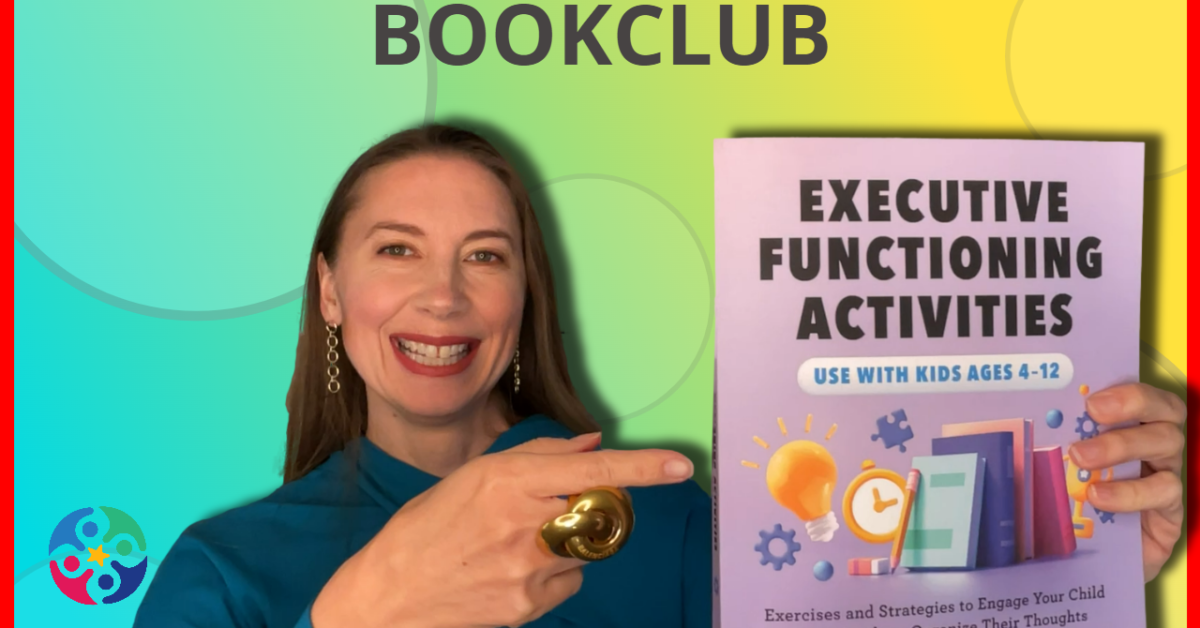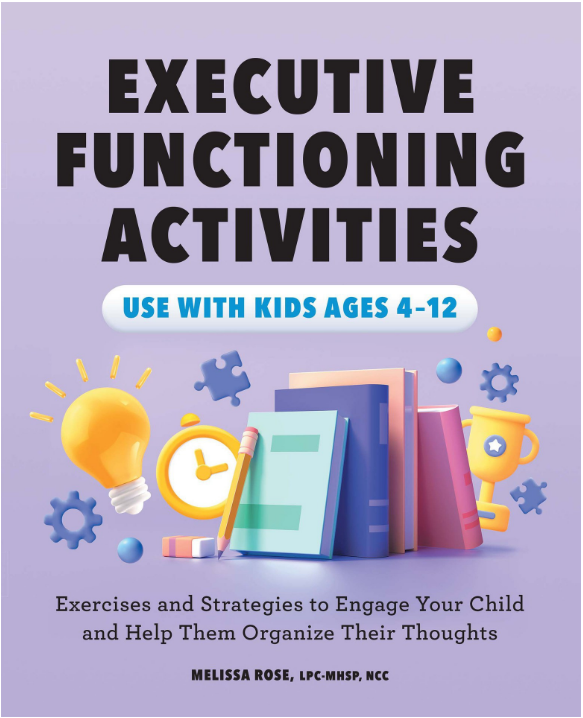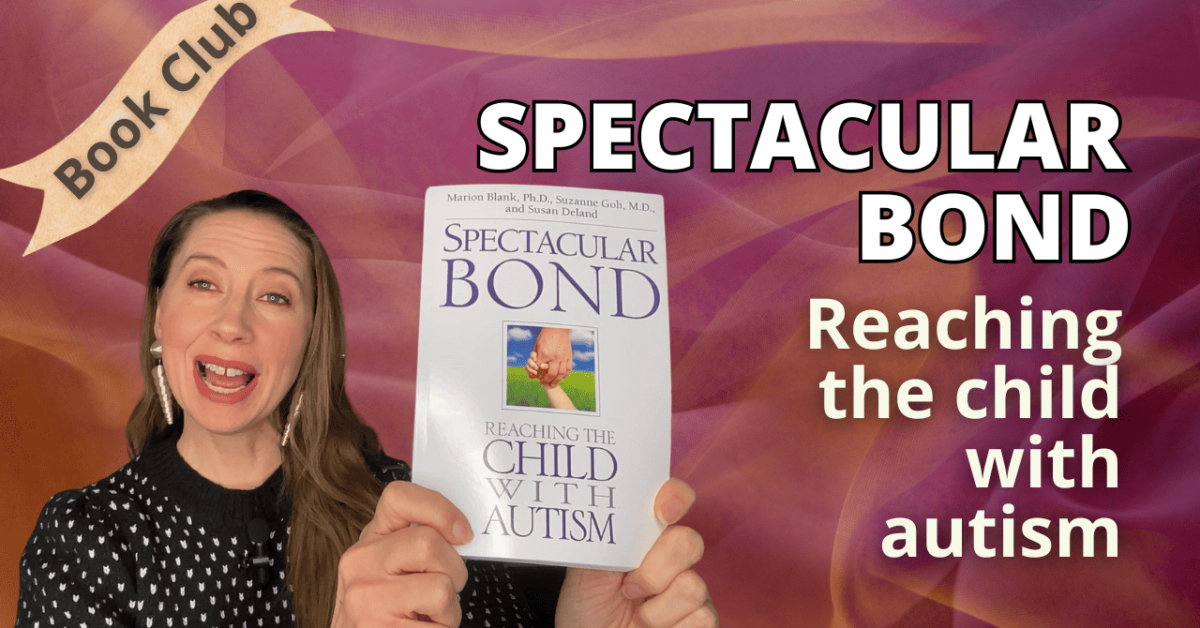Thank you for joining this month’s book club. And thank you to everyone on my email list who voted for what book they wanted me to go over. This month our book club is Executive Functioning Activities. What exactly is executive functioning?
Think about your day, right? There’s a lot of stuff going on and you have to organize the order that you do things to get things done, but you also have to manage your emotions so that the day runs smoothly.
Let me list out the executive functioning skills, and this book does a great job of listing them:
- Impulse control
- Working memory
- Emotional control
- Sustained attention
- Goal oriented persistence
- Task initiation
- Planning and prioritization
- Organization and the last one is
- Flexibility
If your child struggles with any of those things that I just listed out, this book might be quite interesting to you.
Why is Executive skill important?
They’re important so that our children can become as independent as possible. That’s why there’s a lot of focus on executive functioning. Now, you might be thinking, Ok, how do I zero in on one topic of executive functioning skills? This book also has a great assessment, just a visual assessment to look through. If you’re thinking, my child can’t be fully independent, yet they don’t have certain skills, but I’m not sure what those skills are, this book would be worth it to just have this chart here and you can go through and assess.
Like planning and prioritizing, let’s say, does your child have difficulty with stacking or building? And this assessment is for children four to eight, and then they have an assessment for older children as well. If executive functioning skills are a concern of yours and you want to get more specific, this would be an interesting book for you to read and be able to go further. Now, the executive functioning skills that I read out, are in the order that they should be developed. Impulse control has to be developed before planning and prioritization.
It’s really good in the way that they lay these skills out. And so you can kind of see the flow of development. And then with their list, you can see, Ok, where does my child have problems? And then you can speak much easier to an occupational therapist or any therapist that you want to focus on these certain things. It just makes the conversation go a lot easier when you can speak someone else’s language.
And I’ve got to say, executive functioning skills sometimes feel like a completely different language.
Understanding Motivation
On page 22, I really like the discussion that they’re having here. Understanding motivation. It’s hugely important and something that is controversial about ABA therapy. Right?
With ABA therapy, most times in traditional ABA, the motivator was something extrinsic. Match up these colors and you get an M-n-M. That will motivate your child for a few years. But what if they have lunch and they’re not hungry, right? Then you’ll be like, okay, you can work for the iPad. And so they’ll do that. But what if, I don’t know, they’re not interested in something that’s on the iPad? What then?
The real key to motivation is understanding intrinsic motivation. What actually motivates your child on their own to do something? And there’s a good discussion here about how to build intrinsic motivation. Really important.
That’s how our children want to become independent and then take the steps on their own to get there. And there is also a great very short paragraph on parenting and offering support, but also giving space for the child to learn. And my clients and I talk about this all the time. I call it roots and Wings. You’ve got to give them roots, but then you’ve got to let them fly and see how they do.
Activities
The title of the book is Executive Functioning Activities. Alright, now we’ll get into the activity part, and they have activities for each of those different skills. And this activity that I’ll just go over quickly is about controlling emotions. And this involves writing out different emotions on pieces of paper, cutting them up, and folding them, right? Making it more like a game, something fun. And then you choose a feeling and you set the timer for three minutes. And that person has to act out that emotion while the other person tries to guess it.
This activity can be varied depending upon the level of communication of your child, right? They might not be speaking, and then guessing the emotion might not be the easiest thing.
Or maybe they use a device. There are many different ways to vary that. But the whole idea is to take an emotion, and associate the word with how someone behaves, right? So that this way if they’re observing you, they can identify it. Or if they’re the ones acting it out, then they could get some ideas. Like angry, right? There are many things you have three minutes. You have to have so many different ways of expressing anger. You can stomp your feet, you can jump up and down, right? And you’re also teaching your child what are appropriate ways to display a particular emotion.
And that’s always great because we want our children to communicate. Sometimes verbal is very difficult. The more we teach them how physically they can act when they feel that way, the better we’re going to understand them, and the more they’re going to feel connected and bonded with you and feel heard and understood. That’s exactly what you want to do in parenting. And this is just the last exercise.
There are plenty of exercises in here. I went through them. I pulled out two that I thought would be most interesting.
This is an exercise for practice planning and prioritizing. And it’s called the if-then game. I’ve heard parents use this game in many different ways. Sometimes when kids have problems with either transitions or change. You can do the if-end game where you kind of plan things out. So let’s say we’re going to a baseball game and we’re planning to drive there, but maybe our car sometimes breaks down, right? So you might play the game beforehand.
If the car breaks down, then what do we do? And you could have it be a game, depending on their level of communication. And they could come up with their own ideas. We’ll take the subway or we’ll call an Uber, right? It’s just about having the ability to plan and think things through.
Like a baseball game hopefully is an intrinsic motivator and they want to get there. If you were saying, okay, if the car breaks down when going to, let’s say, a particular therapy that they hate, they’re going to be like “Good!”. You want to do these in relevant situations. And there’s a different variation here in this book, but that’s the whole concept of if-then. Adapting to change and planning.
Conclusion
I think this is a great book for people who are interested in executive functioning and doing different activities to help build those skills. The more we practice these kinds of things like, yeah, they’re fun, they’re games, you could have really a good time doing this.
But the idea is you build that skill, you build that mental skill of having the executive functioning, thinking about things differently, thinking about things from a different perspective, really planning. And the more fun you make it, the more your child’s going to learn and the more then they’ll learn on their own. Feel free to check out this book. I think it’s a very specific book, right, just for executive functioning.
But if you want to at least have a better conversation with different therapists about executive functioning, I would definitely without hesitation get this book so you can speak the same language as some of the therapists.





